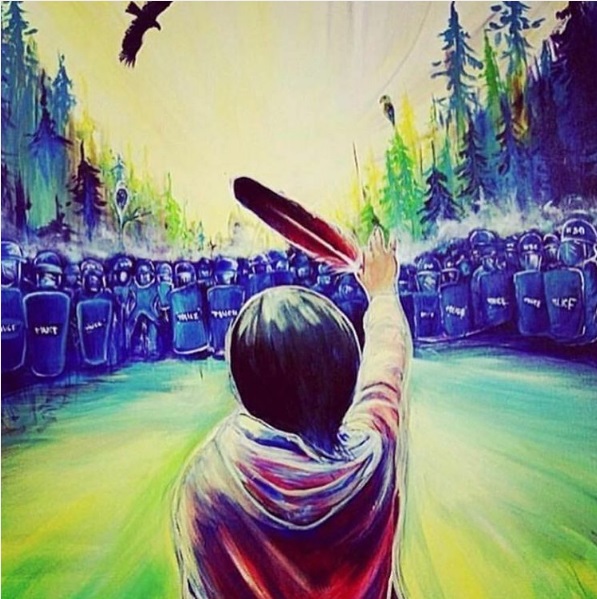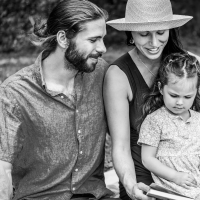![]()
North Dakota’s November wind rippled banners and tugged at coats, scraping against my face with its chill.
Photographers scampered around our periphery; onlookers in camp raised their fists in solidarity. More than 100 of us walked, arms linked, singularly focused on our intention: to pray and hold ceremony at the 1806 bridge, where hundreds of people had been injured by police a few days earlier.
Adrenaline was already in my veins when we stepped onto the road. Our leader’s pronouncement this morning was grim. “Today will be a hard day,” she had said, expecting violence to occur.
The police had only strengthened their presence on the bridge since that night, and we had no doubt about what they were capable of doing to us. The camp was on high alert as reports indicated we might see violence that day. Yet despite such expectations, our procession had a feeling of peaceful determination. We were in prayer.
“We invited you here to pray with us,” said an elder to a crowded dining hall one night. “Nothing more.” This is the same message I have heard many times each day at Standing Rock. “We did not ask you to come to get arrested. We did not ask you to come to fight. The most powerful thing you can do while you’re here is to pray. Live each moment in that prayer.”
And this is the way that the camp has been. While the media has largely favored reports of arrests and police violence, the overwhelming experience at Standing Rock is that of prayerfulness and ceremony.
Prayer is a complicated subject for many Americans, including myself. Some of us associate it with the authoritarian interpretations of Christianity. Others consider it a purely superstitious activity or a fruitless practice that ignores real-life problems. Many new-age schools of thought gloss over prayer in favor of meditation, a more concrete and achievable spiritual practice.
But at Standing Rock, prayer transcends these limited perspectives. Here, I am witnessing prayer infused in daily life: an ancient practice that is as real and sensible as building a fire and cooking food. I am not indigenous, so I cannot explain what prayer means to the people here. But, as I give into the experience, I begin to see prayer as something more than what our limited cultural belief systems suggest. And much like meditation, it has a tangible internal effect.
This is why, as we walked towards the police, the armored vehicles and the razor wire, I centered myself in prayer, feeling a kinship with those who were led in prayer by Ghandi and Dr. Martin Luther King Jr. in similar struggles for basic human rights. Underneath the fear, beneath my shaking heart, I knew the actions I was taking were an expression of love, and whatever I encountered, I could meet with that love—this commitment to what is good in the world.
Focused on a prayer, feeling an overwhelming strength and peacefulness, feeling held by something bigger than ourselves, we turned the corner, towards the looming barricade. We formed a circle, and prayed.
We were not attacked that day. We were able to finish our ceremony and walk back without interference. The next day, however, was different.
The next day, when we gathered for prayer and were faced with violence, we kept praying. When the women and indigenous people were grabbed from our circle, tackled and slammed against walls by police, even these victims kept praying. Those of us in the broken circle kept praying. When we walked slowly out of the building, we held ourselves in prayer, in peace. Our purpose was not to fight with the police. Our purpose was bigger than that.
I realize that it is hard for most Americans to wrap their heads around prayer as an effective form of resistance. How will it stop the pipeline from being built? And yet, it is only through this deep rootedness in something deeper than the problem and bigger than ourselves that we can truly effect social change of the dimensions needed in this critical era.
If not, we only continue repeating the same mistakes again and again, dressing them up in new slogans and ideologies, but with the same results. How many violent revolutions to overthrow a dictator have only resulted in another dictator taking his place?
Prayer is powerful because it does not contribute to the problem we are trying to eradicate, as violent or destructive action would. Prayer is powerful because those with power in our world do not know how to fight it. They fight us with violence, they fight us by creating hardship. But every challenge we face deepens our prayers.
I have only been at Standing Rock a few weeks, and there is still much I do not understand. In humility, I share what I have experienced as a small part of that prayer.
When hundreds of people were injured on Sunday, we prayed. We prayed not only for the injured people, but for the police, as well. “They are our relatives too,” said a man, “They hurt us because they are suffering. We pray for them because we love them, we pray that they wake up.”
When Sophia Wilanksy’s arm was nearly ripped off by a police explosive, we prayed. When the north camp was raided and people were pulled out of sweat lodges and sacred pipes were taken and people were injured, we prayed. When women were strip-searched and locked in dog kennels, we prayed. When the Army Corps announced their plan to evict us from the shelters we built to withstand the winter, we prayed.
We prayed for ourselves, we prayed for those who were suffering, we prayed for those who are perpetrating the suffering. We prayed for everyone involved. We prayed for the earth. We are still praying. And somehow, in ways that are still mysterious to me, our prayers make us strong.
Even if our prayers cannot prevent the pipeline, is this not the way in which we would wish to conduct our lives? Is it not worth it to live our message and remain uncompromising in our integrity even as we see evil crumbling the world before us? Is it not enough to be that one remaining light, flickering in the wind, refusing to go out?
~
Author: Nicholas Tippins
Image: Instagram @karladrummond; Author’s own.
Editor: Yoli Ramazzina









Read 0 comments and reply